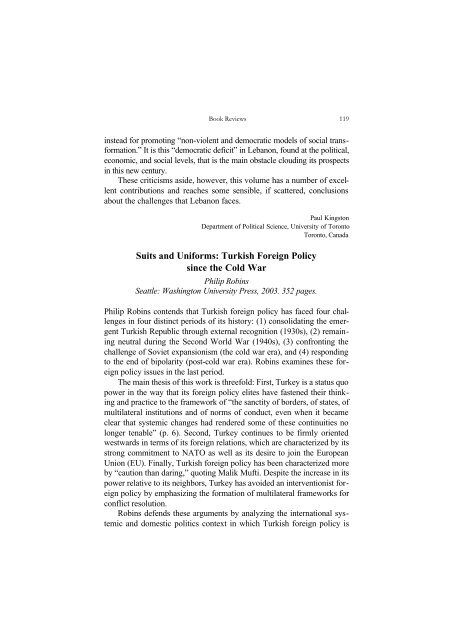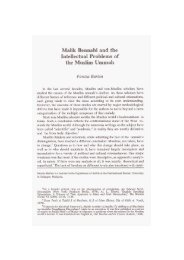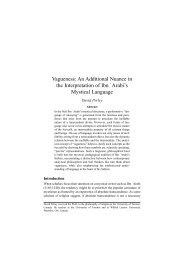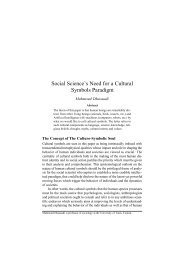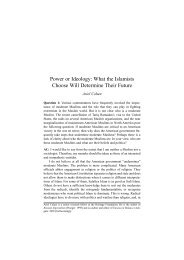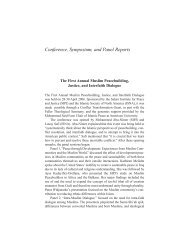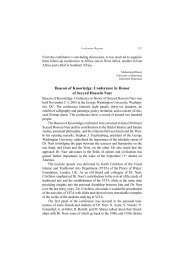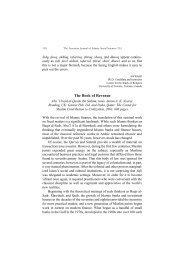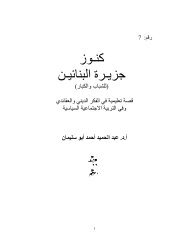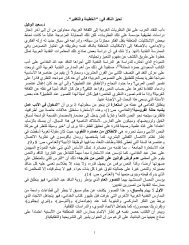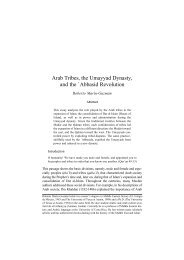Lebanon's Second Republic: Prospects for the ... - I-Epistemology
Lebanon's Second Republic: Prospects for the ... - I-Epistemology
Lebanon's Second Republic: Prospects for the ... - I-Epistemology
Create successful ePaper yourself
Turn your PDF publications into a flip-book with our unique Google optimized e-Paper software.
Book Reviews 119<br />
instead <strong>for</strong> promoting “non-violent and democratic models of social trans<strong>for</strong>mation.”<br />
It is this “democratic deficit” in Lebanon, found at <strong>the</strong> political,<br />
economic, and social levels, that is <strong>the</strong> main obstacle clouding its prospects<br />
in this new century.<br />
These criticisms aside, however, this volume has a number of excellent<br />
contributions and reaches some sensible, if scattered, conclusions<br />
about <strong>the</strong> challenges that Lebanon faces.<br />
Paul Kingston<br />
Department of Political Science, University of Toronto<br />
Toronto, Canada<br />
Suits and Uni<strong>for</strong>ms: Turkish Foreign Policy<br />
since <strong>the</strong> Cold War<br />
Philip Robins<br />
Seattle: Washington University Press, 2003. 352 pages.<br />
Philip Robins contends that Turkish <strong>for</strong>eign policy has faced four challenges<br />
in four distinct periods of its history: (1) consolidating <strong>the</strong> emergent<br />
Turkish <strong>Republic</strong> through external recognition (1930s), (2) remaining<br />
neutral during <strong>the</strong> <strong>Second</strong> World War (1940s), (3) confronting <strong>the</strong><br />
challenge of Soviet expansionism (<strong>the</strong> cold war era), and (4) responding<br />
to <strong>the</strong> end of bipolarity (post-cold war era). Robins examines <strong>the</strong>se <strong>for</strong>eign<br />
policy issues in <strong>the</strong> last period.<br />
The main <strong>the</strong>sis of this work is threefold: First, Turkey is a status quo<br />
power in <strong>the</strong> way that its <strong>for</strong>eign policy elites have fastened <strong>the</strong>ir thinking<br />
and practice to <strong>the</strong> framework of “<strong>the</strong> sanctity of borders, of states, of<br />
multilateral institutions and of norms of conduct, even when it became<br />
clear that systemic changes had rendered some of <strong>the</strong>se continuities no<br />
longer tenable” (p. 6). <strong>Second</strong>, Turkey continues to be firmly oriented<br />
westwards in terms of its <strong>for</strong>eign relations, which are characterized by its<br />
strong commitment to NATO as well as its desire to join <strong>the</strong> European<br />
Union (EU). Finally, Turkish <strong>for</strong>eign policy has been characterized more<br />
by “caution than daring,” quoting Malik Mufti. Despite <strong>the</strong> increase in its<br />
power relative to its neighbors, Turkey has avoided an interventionist <strong>for</strong>eign<br />
policy by emphasizing <strong>the</strong> <strong>for</strong>mation of multilateral frameworks <strong>for</strong><br />
conflict resolution.<br />
Robins defends <strong>the</strong>se arguments by analyzing <strong>the</strong> international systemic<br />
and domestic politics context in which Turkish <strong>for</strong>eign policy is


